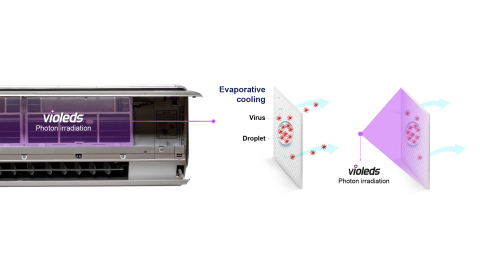ANSAN, South Korea--(BUSINESS WIRE)--Seoul Viosys (KOSDAQ:092190), a leading compound semiconductor solution provider, announced that it promotes new Violeds technology solution, the world’s first ultraviolet LED technology proven to sterilize new coronaviruses, for air conditioning and heating systems.
Seoul Viosys will hold a campaign of pilot installation for new Violeds technology solution by August 31st, 2020 focusing on public facilities such as offices, shopping centers, and airport in the world as a part of anti-coronavirus. Inquiries and applications are available on its website (www.seoulviosys.com/en/) and Seoul Viosys’ partners will support additional requests after finishing the first campaign period.
Seoul Viosys provides major manufacturer of air conditioners with optimized UV LED solutions based on successful testing results of 99.9% sterilization of the new coronavirus in 30 seconds by the research group of Korea University. In June, a global air conditioner manufacturer that produces 40 million per year has adopted Violeds technology for its thirty models.
Through the results of testing by Guangzhou Institute of Microbiology in China (CGMT), Gree demonstrates that its new “Fresh Air” air conditioner with Violeds UV LED technology has the performance to sterilize 99.15% of viruses and bacteria, 98% of enteroviruses such as EV71 and H1N1, and 99% of staphylococcus albus bacteria. In addition, it has been proven to sterilize 90% of various harmful viruses in air in 2 hours when using their air conditioners.
Violeds technology has been adopted not only by the Chinese AC manufacturer Gree, but also by a leading in-duct air treatment supplier in the U.S. Seoul Viosys will provide its technology for air conditioners of a leading electronics brand.
Conventional air conditioners typically draw outside air into the AC unit, and discharge that air back into the interior after cooling and filtering, where it is continuously recirculated. This recirculation of indoor air may cause a higher risk of infection through aerosol transmission when viruses are present. The amount of dust and moisture on the cooling filter can also transmit harmful viruses. Conventional filter in air purification system can filter out general droplets or fine dust more than 0.3μm but the viruses such as new coronavirus and SARS virus itself as small as 0.1μm can pass through the HEPA filters as it is.
“As a result of successful production approval to supply Violeds products and expanding customer demand, Violeds UV LEDs have clearly been recognized as essential technology for HVAC (Heating, Ventilation, and Air Conditioning) systems. We believe that our new Violeds technology solution for disinfection of air conditioning and heating systems helps to eliminate viruses in air and protect people from COVID-19 pandemic,” said a representative of Seoul Viosys.
About Seoul Viosys
Seoul Viosys is a full-line solution provider for UV LED, VCSEL (Vertical Cavity Surface Emitting Laser), the next-generation light source for 3D sensor and laser, and a single-pixel RGB “Micro Clean Pixel” for displays. Established in 2002 as a subsidiary of Seoul Semiconductor, it captured No. 1 market share in the UV LED industry (LEDinside, 2018). Seoul Viosys has an extensive UV LED portfolio with all wavelengths ranging from 200nm to 1600nm, including ultraviolet rays (UV), visible rays, and infrared rays. The company holds more than 4,000 patents related to UV LED technology. Violeds, its flagship UV LED technology, provides a wide range of industries with optimal solutions for robust sterilization and disinfection (UV-C), skin regeneration (UV-B), water/air purification and effective cultivation for horticulture. In 2018, Seoul Viosys acquired RayCan, a leading optoelectronic specialist, to add advanced VCSEL technology, which supports smartphone facial recognition and autonomous driving, and has started mass production. In January 2020, it introduced a disruptive “Micro Clean Pixel” that has the potential to be a game-changer in the display market. To learn more, visit http://www.seoulviosys.com/en/.




